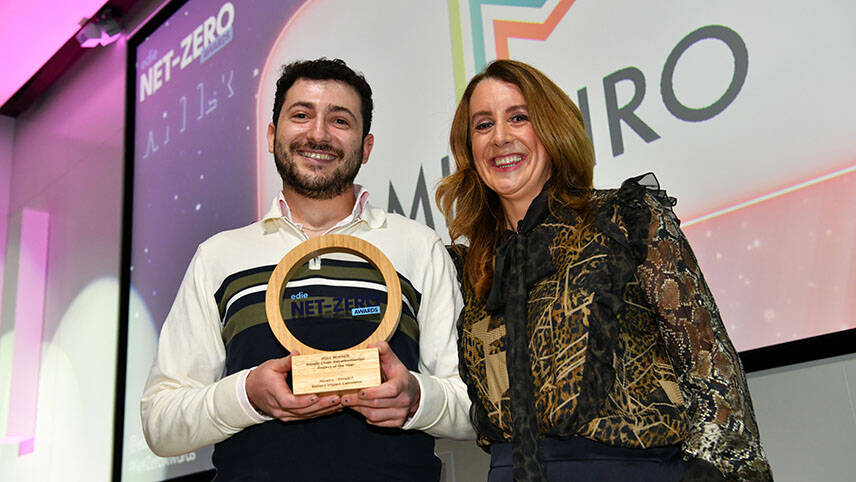This premium content is exclusive to edie Members.
To find out more about edie Membership, please click below.
If you are an existing member, login here

At a glance:
Who: Minviro
What: Lifecycle calculator for battery emissions
Where: EU trials
When: Ongoing
Why: To uncover embodied carbon of the battery supply chain
The challenge
Transportation accounts for around 20% of global emissions, but even the shift to net-zero will require decarbonisation of new value chains, namely for electric vehicles (EVs). The switch to battery solutions will also require a focus on emissions given that raw material impacts can contribute on average 80% of a given battery’s embodied climate change impact.
The solution
MineBIT software is a solution from Minviro that was established via partnerships with academia that enables the entirety of the battery value chain – ranging from suppliers and manufacturers to OEMs – to map the supply chain of critical raw materials and assess life cycle environmental impacts including carbon emissions through systematic, science-based life cycle assessments (LCAs), and create decarbonisation roadmaps for sustainable sourcing of battery raw materials.
How the project works
Against the backdrop of the EU Battery Regulation, which serves as a model to mandate digital product passports for certain items that detail their carbon footprint, the MineBIT software helps identify and map key product and material information.
One of the key aims of the software is to identify the carbon footprint of specific battery models across their lifecycle. Although many ‘off-the-shelf’ LCA models exist, data for mining – a key part of the battery supply chain – is poor and software is not yet commercially available. Minviro estimates that the carbon impacts associated with mining are therefore underestimated by 6-7 times, which hinders decarbonisation across the supply chain.
Minviro has spent years collecting high-quality data impacts of raw materials used in battery production, which has been incorporated into MineBIT.
The project has been developed in collaboration with the University of Warwick, which brought world-leading expertise in battery manufacturing and in dynamic supply chain development, connecting the whole value chain within the decision-making processes/
This project was part of an InnovateUK Smart Grant and supported by OEMs and battery manufacturers throughout the development through trials and feedback loops. Several research institutions were also involved in discussions, presentations and database development validating the state of the art of the project.
EU Battery Regulation requirements were also adopted during the soft launch phase and are being integrated into the tool for users to keep up to date with the latest developments in the regulatory environment.
Minviro has also benefited by engaging with a wide range of stakeholders due to its membership in several industry associations, including CMA, RECHARGE and the GBA. This has given the project better informed decision making processes on decarbonisation roadmaps for critical metals, batteries and their supply chains.
MineBIT enabled Minviro to feed supply chain impacts and decarbonisation insights into multiple global, European and UK-based regulations and standards, shaping the future of the industry with science and technology.
The results
Several OEMs, battery material suppliers, manufacturers, and research institutes have tried MineBIT since its inception. So far, the databases developed for this tool have been used in more than 200 mining, mineral processing and battery manufacturing projects globally.
Net-zero roadmaps have been created for several mining and manufacturing companies, informing the company strategies and sustainability studies with accurate data and methods such as carbon abatement curves.
The project is now integrating bespoke circularity options to add to these pathways, including how repurposing, reuse and remanufacturing can all be integrated.
Estimates from Minviro suggest that, assuming each material analysed using MineBIT bears half the impact of its pre-existing supply chain, a standard battery production Gigafactory would be able to save 40 kg CO2 per kWh. This amounts to 1.5 million tonnes of CO2 saved for one single manufacturer when scaled up annually.
The judges said:
We need to create a circular materials supply chain as we increase electrification across the economy. MineBIT is an impressive tool that offers battery manufacturers and end-users an opportunity to operate in a more sustainable way. ‘Supply chain engagement’ was a competitive category to enter. The scalability, engagement with researchers, integration with regulation, and potential widespread application of this product helped MineBIT to stand out.
© Faversham House Ltd 2024 edie news articles may be copied or forwarded for individual use only. No other reproduction or distribution is permitted without prior written consent.

